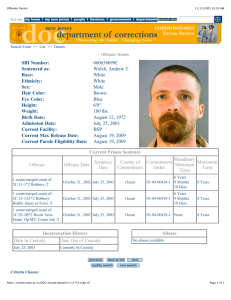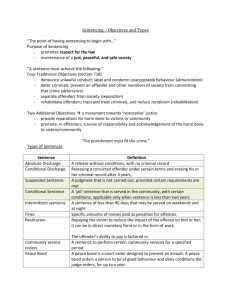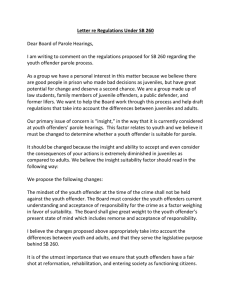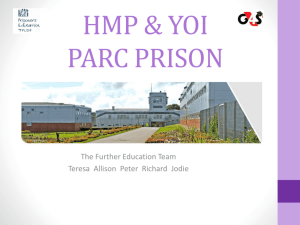OREGON YOUTH AUTHORITY Policy Statement Part I – Administrative Services
advertisement
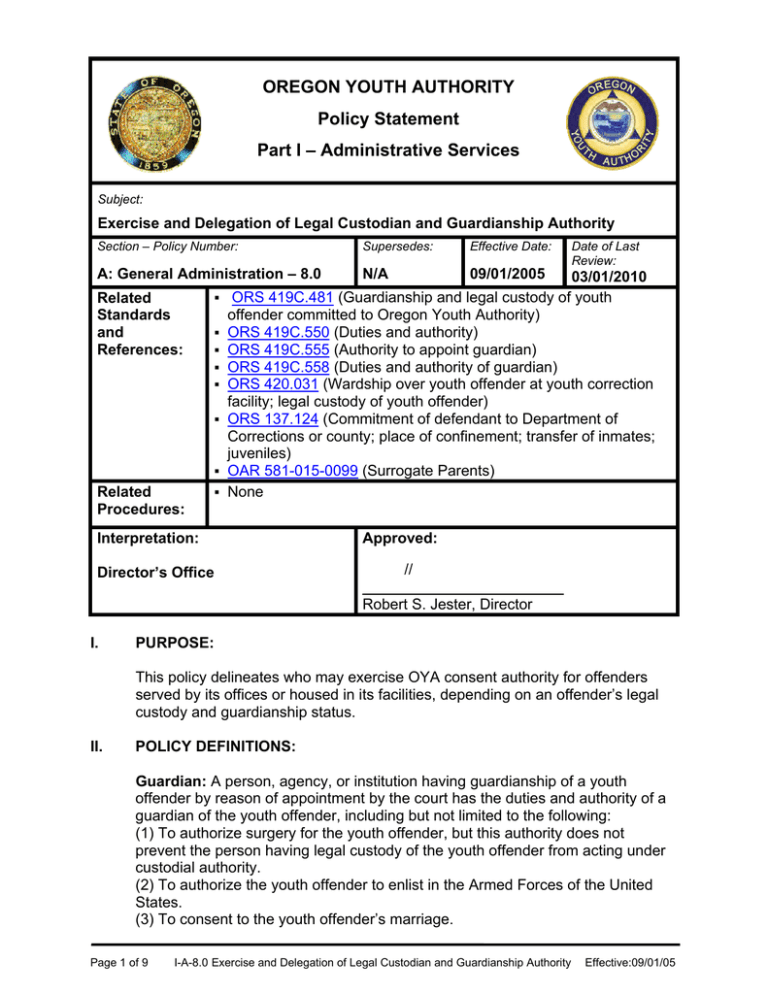
OREGON YOUTH AUTHORITY Policy Statement Part I – Administrative Services Subject: Exercise and Delegation of Legal Custodian and Guardianship Authority Section – Policy Number: Supersedes: Effective Date: A: General Administration – 8.0 N/A 09/01/2005 Related Standards and References: Related Procedures: 03/01/2010 ORS 419C.481 (Guardianship and legal custody of youth offender committed to Oregon Youth Authority) ORS 419C.550 (Duties and authority) ORS 419C.555 (Authority to appoint guardian) ORS 419C.558 (Duties and authority of guardian) ORS 420.031 (Wardship over youth offender at youth correction facility; legal custody of youth offender) ORS 137.124 (Commitment of defendant to Department of Corrections or county; place of confinement; transfer of inmates; juveniles) OAR 581-015-0099 (Surrogate Parents) None Interpretation: Approved: Director’s Office // ________________________ Robert S. Jester, Director I. Date of Last Review: PURPOSE: This policy delineates who may exercise OYA consent authority for offenders served by its offices or housed in its facilities, depending on an offender’s legal custody and guardianship status. II. POLICY DEFINITIONS: Guardian: A person, agency, or institution having guardianship of a youth offender by reason of appointment by the court has the duties and authority of a guardian of the youth offender, including but not limited to the following: (1) To authorize surgery for the youth offender, but this authority does not prevent the person having legal custody of the youth offender from acting under custodial authority. (2) To authorize the youth offender to enlist in the Armed Forces of the United States. (3) To consent to the youth offender’s marriage. Page 1 of 9 I-A-8.0 Exercise and Delegation of Legal Custodian and Guardianship Authority Effective:09/01/05 (4) To make other decisions concerning the youth offender of substantial legal significance. (5) To make such reports and to supply such information to the court as the court may from time to time require. Legal Custody: A person, agency, or institution having legal custody of a youth offender as awarded by a court has the following duties and authority: (1) To have physical custody and control of the youth offender. (2) To supply the youth offender with food, clothing, shelter, and incidental necessaries. (3) To provide the youth offender with care, education, and discipline. (4) To authorize ordinary medical, dental, psychiatric, psychological, hygienic, or other remedial care and treatment, and, in an emergency when the youth offender’s safety appears urgently to require it, to authorize surgery or other extraordinary care. (5) To make such reports and to supply information to the court as required by the court. (6) To apply for any Social Security benefits or public assistance to which the youth offender is entitled and to use the benefits or assistance to pay for the care of the youth offender. Physical custody: The routine care and control of an offender who is under 18 years of age at the time of committing the offense, under 20 years of age at the time of sentencing, and convicted and committed to the Department of Corrections (DOC). DOC will transfer the physical custody of the person to OYA if: (1) The person will complete the sentence imposed before the person attains 25 years of age; or (2) DOC and OYA determine that, because of the person’s age, immaturity, mental or emotional condition or risk of physical harm to the person, the person should not be incarcerated initially in a DOC institution. Substitute care providers: Persons authorized by OYA through contract or other written agreement to provide supervision and care for offenders on parole or probation status in the community. Such persons include, but are not limited to, contracted residential treatment providers and certified foster parents (including respite providers). Educational surrogate: An individual who acts in place of a parent in safeguarding a child's rights in the special education decision-making process when: the parent cannot be identified or located after reasonable efforts; [or when] there is reasonable cause to believe that the child has a disability and is a ward of the state; or at the request of a parent or adult student. III. POLICY: Where OYA has legal custody and/or guardianship of an offender, OYA will exercise its authority to make certain decisions regarding the welfare of the offender through its staff and substitute care providers as delegated below. All decisions will be made within the context of what is in the best interest of the offender and what measures may be taken on behalf of the offender. Page 2 of 9 I-A-8.0 Exercise and Delegation of Legal Custodian and Guardianship Authority Effective:09/01/05 Guardianship is not automatically assigned when physical or legal custody is given. IV. Exercise of Legal Custodian Authority A. B. C. Page 3 of 9 OYA may authorize substitute care providers to provide consent for: 1. The offender's registration in regular curriculum in public school; 2. Making or changing the offender's schedule of classes in school; 3. The offender’s absence from school; 4. The offender's participation in school and extracurricular activities; 5. The offender's participation in school meals program; and 6. Routine medical care and dental care, including vaccinations and immunizations, routine examinations and lab tests, or treatment for minor illnesses such as the flu. The juvenile parole/probation officer (JPPO) may provide consent for any action to which the physical custodian/substitute care provider may consent, plus: 1. Purchase of school insurance for the offender; 2. Application for worker’s permits or releases. 3. School testing; 4. Access to academic or school behavioral records; 5. Participation in outdoor school; 6. Psychiatric or psychological evaluation, or outpatient psychiatric or psychological treatment; 7. Outpatient mental health treatment; and 8. Intra-state travel. The superintendent/camp director or the parole/probation supervisor/manager may provide consent for any action to which the JPPO may consent, plus: 1. Authorize, in an emergency when the offender’s safety appears urgently to require it, surgery or other extraordinary care; 2. Make such reports and to supply such information to the court as the court may from time to time require; and I-A-8.0 Exercise and Delegation of Legal Custodian and Guardianship Authority Effective:09/01/05 3. V. Apply for any Social Security benefits or public assistance to which the offender is otherwise entitled and to use the benefits or assistance to pay for the care of the offender. Exercise and Delegation of Guardian Authority A. When the court places an offender in the legal custody of OYA, it may also grant guardianship of the offender to OYA. If the court grants guardianship to OYA, OYA will retain this guardianship of the offender while the offender remains in the legal custody of OYA. In addition to the custodial authority above, OYA delegates its guardianship authority to its OYA staff as follows. B. The parole/probation supervisor/manager of an office or the superintendent/camp director of a facility where offenders are placed will exercise OYA consent authority to the following actions with respect to offenders served by that office or facility: C. Page 4 of 9 1. Emergency and routine surgery; 2. Major medical and surgical procedures that are not extraordinary or controversial, such as treatment for broken bones or appendicitis; 3. Admission to a state mental health facility, or to any state hospital or private hospital for purpose of psychiatric treatment; 4. Enlistment of an offender in the Armed Forces or the Job Corps; 5. Registration in special schools; 6. Application for driver's training, permits, and license; and 7. Examination by a law enforcement agency (e.g. polygraphs, interrogations without a warrant, etc.). In addition to the delegations above, OYA's consent authority to the following actions for an offender in its legal custody will be exercised only by an Assistant Director or, in his or her absence, the Director: 1. Abortion, except when a young woman age 15 or older exercises her statutory right to consent to her own abortion; 2. Extraordinary or controversial medical or surgical procedures, such as Do Not Resuscitate Order (DNR), organ transplants, kidney dialysis, open heart surgery or any procedure involving substantial life threat; 3. Any medical or surgical procedure to which a legal parent or guardian of the offender is opposed; I-A-8.0 Exercise and Delegation of Legal Custodian and Guardianship Authority Effective:09/01/05 VI. 4. Marriage; and 5. Interstate travel and international travel. Actions Not Authorized The following actions are not authorized under any circumstances: VII. A. No OYA staff will consent to educational planning which is defined as the responsibility of an educational surrogate. B. No staff or agent of OYA will exercise OYA's consent authority to the purchase of or ownership of a motor vehicle by an offender in legal custody of OYA. This prohibition does not prevent an offender in the legal custody of OYA from exercising the right to purchase or own a motor vehicle on his or her own account; C. No staff will co-sign or counter-sign any purchase contract for an offender in OYA's custody; and D. No staff will accept responsibility or serve as conservator of an offender's property or estate. DOC Offenders in the Physical Custody of OYA A. B. Where the Department of Corrections (DOC) has legal custody of offenders who are placed in OYA physical custody, DOC, pursuant to administrative rule, will exercise its authority through OYA staff, and through delegation to other persons as follows. DOC will: 1. Retain legal custody of the offender, regardless of where the offender is placed; 2. Provide the offender with special physical and/or medical treatment that is more than routine when requested by OYA; 3. Coordinate program planning, classification, and all status change decisions concerning each DOC offender on administrative transfer to an OYA close custody facility; 4. Issue all warrants and place All Points Bulletins (APBs) for DOC offenders who escape from an OYA close custody facility; and 5. Notify OYA close custody facility of scheduled Board of Parole and Post-Prison Supervision hearings for transferred DOC offenders. The OYA close custody facility will: 1. Page 5 of 9 Care for DOC offenders on administrative transfer from the DOC in the same manner as other offenders. Copies of all regular semiannual reports and special reports will be promptly provided to the I-A-8.0 Exercise and Delegation of Legal Custodian and Guardianship Authority Effective:09/01/05 functional unit manager of the Offender Information and Sentence Computation Unit; VIII. 2. Not release a DOC offender from their physical custody without the express approval of the DOC; 3. Exercise reasonable control and utilize security units when warranted. All behavior problems or circumstances deemed serious by OYA staff will be brought to the attention of the OYA superintendent and the Coffee Creek Correctional Institution (CCCF) Intake Manager; 4. In addition, immediately notify the control center at Santiam Correctional Institution if a DOC offender escapes from OYA physical custody. 5. Report to the CCCF Intake Manager the alleged commission of any other crime while on administrative transfer to an OYA close custody facility; and 6. Transport transferred DOC offenders to scheduled Board of Parole and Post-Prison Supervision hearings. LOCAL OPERATING PROTOCOL REQUIRED: NO Page 6 of 9 I-A-8.0 Exercise and Delegation of Legal Custodian and Guardianship Authority Effective:09/01/05 Oregon Youth Authority Consent Authorizations Exercise of Legal Custodian Authority Physical Custodian/Substitute Care Provider May consent to: A. Public school registration B. Changing class schedules Juvenile Parole/Probation Officer (JPPO) Any action to which physical custodian/substitute care provider may consent, plus: Parole/Probation Supervisor/Superintendent/ Camp Director Any action to which parole/probation officer may consent, plus: A. Application for worker’s permits or releases A. Emergency/routine surgery or other extraordinary care B. School testing B. Report and supply information to the court C. Absence from school D. Participation in school and/or extracurricular activities C. Access to academic/behavioral records E. School meal program F. Routine medical/dental care C. Apply for any Social Security benefits or public assistance D. Participation in outdoor school that is part of regular school curriculum E. Psychiatric/psychological tests or evaluations F. Outpatient mental health treatment G. In-state travel All educational decisions for special education youth require a surrogate parent appointed by a judge or school district. It is OYA policy that an offender’s parents be involved in decisions of medical/legal significance whenever possible and appropriate. Page 7 of 9 I-A-8.0 Exercise and Delegation of Legal Custodian and Guardianship Authority Effective:09/01/05 Exercise and Delegation of Guardian Authority This grid illustrates level of decision making authority for youth offenders committed to OYA for whom OYA has been granted guardianship by the committing juvenile court. (See ORS 419C.481, 419C.550, 419C.555, and 419C558 [1995] for detailed discussion of responsibilities of OYA as legal guardian.) Guardianship is not automatically assigned when physical or legal custody is given. Parole/Probation Supervisor/ Facility Superintendent/ Camp Director May consent to: A. Admission to State Hospital or mental health facility for psychiatric treatment. B. Enlistment in the Armed Forces or Job Corps Assistant Director/Director Any action to which a parole/probation supervisor or facility superintendent/camp director may consent, plus: A. Abortion, except when a young woman age 15 or older exercises her statutory right to consent to her own abortion; C. Registration in special schools D. Applications for driver’s training, permits, and license E. Examination by a law enforcement agency (e.g., polygraphs, interrogations without a warrant, etc.) B. Extraordinary or controversial medical or surgical procedures, such as Do Not Resuscitate Order (DNR), organ transplants, kidney dialysis, open heart surgery or any procedure involving substantial life threat; C. Any medical or surgical procedure to which a legal parent or guardian of the offender is opposed; D. Marriage; E. Out-of-state travel. OYA may not consent to marriage or make significant legal decision for youth in the legal custody of the Department of Corrections. This level of decision making authority requires guardianship. It is OYA policy that a youth’s parents be involved in decisions of medical/legal significance whenever possible and appropriate. Page 8 of 9 I-A-8.0 Exercise and Delegation of Legal Custodian and Guardianship Authority Effective:09/01/05 DOC Offenders in the Physical Custody of OYA Where DOC has legal custody of offenders who are placed in OYA physical custody, DOC will exercise its authority through OYA staff, and through delegation to other persons as follows. DOC DOC will: A. Retain legal custody of the offender, regardless of where the offender is placed; B Provide the offender with special physical and/or medical treatment that is more than routine when requested by OYA; C. Coordinate program planning, classification, and all status change decisions concerning each DOC offender; D. Issue all warrants and place All Points Bulletins (APBs) for DOC offenders who escape from an OYA close custody facility; and E. Notify the OYA close custody facility of scheduled Board of Parole and Post-Prison Supervision hearings for transferred DOC offenders. OYA The OYA close custody facility will: A. Care for DOC offenders in the same manner as other offenders. Copies of all regular semi-annual reports and special reports will be provided to the functional unit manager of the Offender Information and Sentence Computation Unit; B. Not release a DOC offender from their physical custody without the express approval of the DOC; C. Exercise reasonable control and utilize security units when warranted. All behavior problems or circumstances deemed serious by OYA staff will be brought to the attention of the OYA superintendent and the Coffee Creek Correctional Institution (CCCF) Intake Manager; D. Immediately notify the control center at Santiam Correctional Institution if a DOC offender escapes from OYA physical custody. E. Report to the CCCF Intake Manager the alleged commission of any crime; F. Transport transferred DOC offenders to scheduled Board of Parole and Post-Prison Supervision hearings. Page 9 of 9 I-A-8.0 Exercise and Delegation of Legal Custodian and Guardianship Authority Effective:09/01/05


